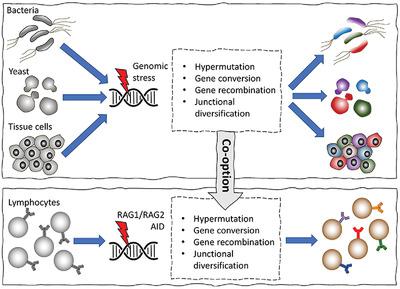Our official English website, www.x-mol.net, welcomes your
feedback! (Note: you will need to create a separate account there.)
Genomic Stress Responses Drive Lymphocyte Evolvability: An Ancient and Ubiquitous Mechanism.
BioEssays ( IF 3.2 ) Pub Date : 2020-08-07 , DOI: 10.1002/bies.202000032 Bartlomiej Swiatczak 1
BioEssays ( IF 3.2 ) Pub Date : 2020-08-07 , DOI: 10.1002/bies.202000032 Bartlomiej Swiatczak 1
Affiliation

|
Somatic diversification of antigen receptor genes depends on the activity of enzymes whose homologs participate in a mutagenic DNA repair in unicellular species. Indeed, by engaging error‐prone polymerases, gap filling molecules and altered mismatch repair pathways, lymphocytes utilize conserved components of genomic stress response systems, which can already be found in bacteria and archaea. These ancient systems of mutagenesis and repair act to increase phenotypic diversity of microbial cell populations and operate to enhance their ability to produce fit variants during stress. Coopted by lymphocytes, the ancient mutagenic processing systems retained their diversification functions instilling the adaptive immune cells with enhanced evolvability and defensive capacity to resist infection and damage. As reviewed here, the ubiquity and conserved character of specialized variation‐generating mechanisms from bacteria to lymphocytes highlight the importance of these mechanisms for evolution of life in general.
中文翻译:

基因组应激反应驱动淋巴细胞进化:一种古老而普遍的机制。
抗原受体基因的体细胞多样化取决于酶的活性,这些酶的同源物参与了单细胞物种中的诱变 DNA 修复。事实上,通过使用容易出错的聚合酶、间隙填充分子和改变的错配修复途径,淋巴细胞利用基因组应激反应系统的保守成分,这些成分已经在细菌和古细菌中发现。这些古老的诱变和修复系统可增加微生物细胞群的表型多样性,并增强它们在压力下产生适合变体的能力。在淋巴细胞的作用下,古老的诱变处理系统保留了其多样化功能,为适应性免疫细胞灌输了增强的进化能力和抵御感染和损伤的防御能力。正如这里所评论的,
更新日期:2020-09-24
中文翻译:

基因组应激反应驱动淋巴细胞进化:一种古老而普遍的机制。
抗原受体基因的体细胞多样化取决于酶的活性,这些酶的同源物参与了单细胞物种中的诱变 DNA 修复。事实上,通过使用容易出错的聚合酶、间隙填充分子和改变的错配修复途径,淋巴细胞利用基因组应激反应系统的保守成分,这些成分已经在细菌和古细菌中发现。这些古老的诱变和修复系统可增加微生物细胞群的表型多样性,并增强它们在压力下产生适合变体的能力。在淋巴细胞的作用下,古老的诱变处理系统保留了其多样化功能,为适应性免疫细胞灌输了增强的进化能力和抵御感染和损伤的防御能力。正如这里所评论的,











































 京公网安备 11010802027423号
京公网安备 11010802027423号